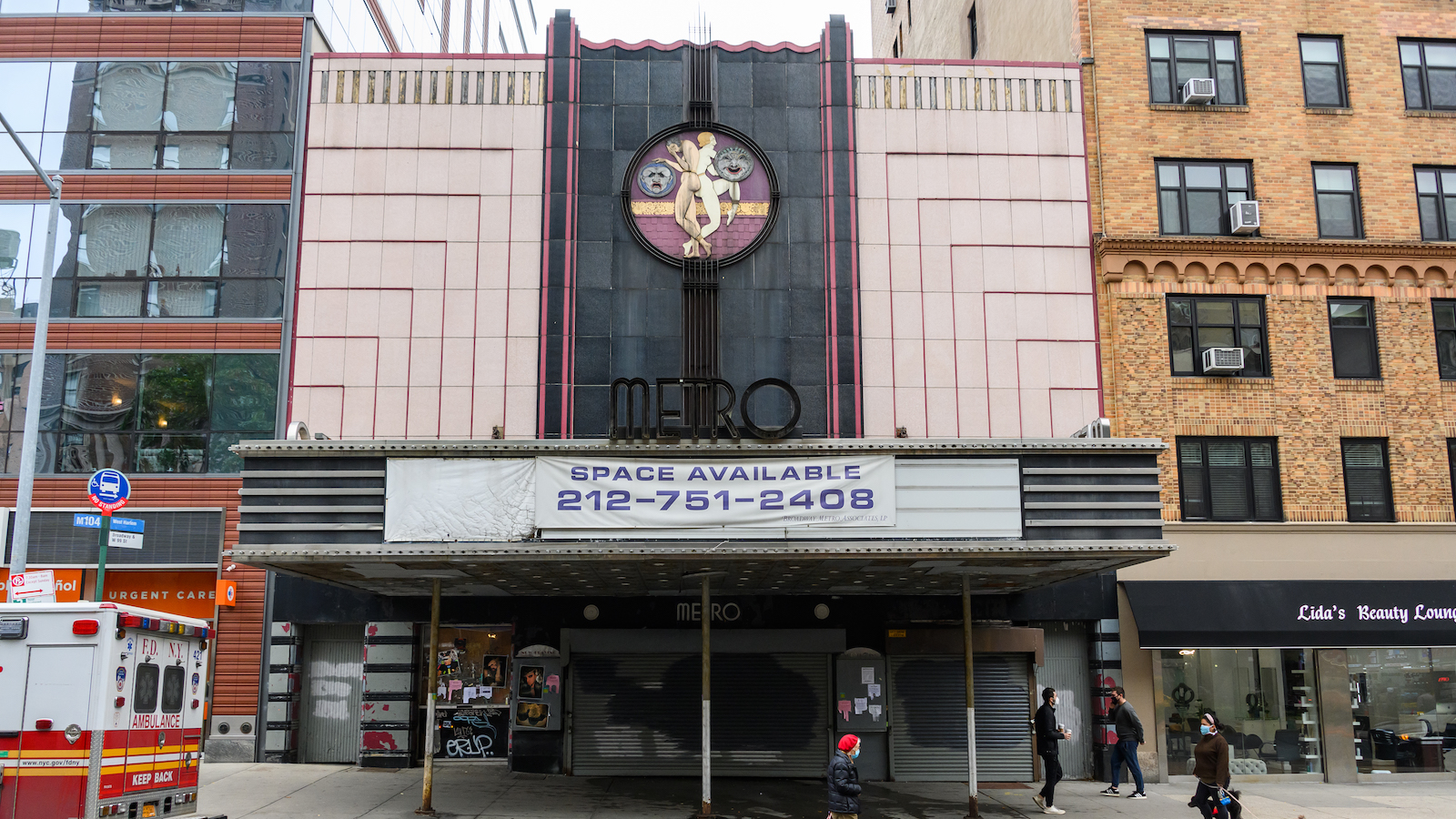For nearly 20 years, the Metro Theater on the Upper West Side of Manhattan has sat closed and empty, despite its status as a protected city landmark. In that time, there have been several attempts to reopen its doors, the ones just beneath an art deco facade. But a potential new buyer has emerged with concrete plans, some serious Hollywood supporters, and the endorsement of a local community group.
IndieWire can exclusively reveal that film producer and veteran executive Ira Deutchman (“Searching for Mr. Rugoff,” founder of CineCom and Fine Line Features) is in talks to acquire the Metro Theater, and his plan for the space has the endorsement of local community group the New Friends of Metro Theater.
Deutchman has also assembled an advisory board that includes Martin Scorsese, John Turturro, Ethan Hawke, Griffin Dunne, and Bob Balaban, all of whom will help secure funding for the theater’s purchase and renovation. Other supporters on the advisory board include Tim League (Founder, Alamo Drafthouse Cinemas), Russ Collins (Marquee Arts and Founder of the Art House Convergence), Richard Peña (Director Emeritus of the New York Film Festival), Jonathan Sehring (former President of IFC Entertainment), and Paul Richardson (former CEO of Landmark Theaters).
“The Upper West Side has become essentially a cinema desert,” Deutchman told IndieWire.
There are 20 full-time art house screens below 14th St. (he counted), and a similar amount in Brooklyn. North of Manhattan’s 14th St. there are just three full-time screens dedicated to art house films (and one part-time screen).
“It’s a really slap-your-forehead moment because it used to be such a hotbed of art film activity,” Deutchman said.

The Metro Theater, previously known as the Midtown Theater and then the Metro Twin, has been located at 2626 Broadway since 1933 and was a first-run movie palace up until the 1950s. It has been everything from an adult-film theater venue, a repertory theater, and an independent art house venue. After several owners and renovations, the theater closed permanently in 2005; its interior was gutted the following year. While the terracotta design and the comedy-and-tragedy medallion remain on the Metro’s facade, the inside is an empty, open space.
In 2012, Alamo Drafthouse was interested in turning the Metro into a three-story, five-screen, dine-in theater, but those plans (and that acquisition) never came to fruition. A decade later, an independent group spearheaded by Alamo Drafthouse leased the space. They nearly had shovels in the ground, but plans fell apart in April of this year, primarily due to the death of the theater’s owner Albert Bialik in November 2023. Bialik had owned the Metro for just over 20 years, about as long as it has been closed.
Since then, Deutchman has been in talks with Bialik’s estate about his new vision — and achitectural plan — for the Metro. Like Alamo Drafthouse, he’s mapped out five screens across three stories. But instead of planning it as a dine-in theater, the theater’s first floor will be a café spilling out to Broadway capable of hosting receptions or community events. He’s also planning an educational space for students, and even a senior docent program.
Deutchman envisions his Metro as a not-for-profit venture. He and partner Adeline Monzier, founder of Upper West Side Cinema Center, Inc., intend to solicit donations, find private investors, and secure additional financial support from either the city or the state governments. It is a landmark, after all. Deutchman says donors could potentially have naming opportunities or other perks in supporting the cinema. The full plan is outlined on their website.

For Liza Cooper, who sits on the board with New Friends of Metro, the theater represents generations worth of nostalgia. The community group recently held a festival in which longtime residents of the Upper West Side shared memories of the Metro. There were stories of birthday parties and first dates; Cooper called it the “gem of the community.” Now though there’s an entire generation that has lived nearby, including her own son, who have only ever seen it shuttered.
“He has missed out on the opportunity of having this gorgeous theater open across the street. And I think that every person, family, young person, older person, they all have that feeling that it has just been a real gap,” Cooper told IndieWire. “Ira and Adeline’s plan and vision would absolutely overturn that and transform the neighborhood. It would be a financial boon to the real estate in the neighborhood, as well as the restaurants, the businesses, the bars. Everything would have a whole new crowd of people. So it’s a win-win for everyone.”
Cooper also participated in the most-recent effort to get the theater reopened; she knows the process has been something of a saga. The primary issues have been cost (buying the space and totally renovating it), the late owner’s reticence to sell, and also a wrinkle involving the space’s air rights, which would restrict any future owners from expanding upwards.
But something feels different this time. Having Martin Scorsese certainly doesn’t hurt.

But there is still that pesky cost. Deutchman could not comment on financials, but said the expense of the renovation will be “significant” and that the Metro is a “blank slate,” requiring major fundraising, deal-making, permitting, and construction that he expects will take several years to complete. Cooper estimated the actual acquisition of the theater could be in the range of $5-10 million. She believes it will cost an additional $15-25 million to properly restore it.
The diamond in the (very) rough is worth it, Deutchman said.
“The Upper West Side needs this,” he said. “I was looking for years for a piece of real estate that could be suitable for this type of an operation…it seemed really impossible.”
Opening a theater, whether for-profit or not, presents a major financial risk. The specialized market has shown only modest signs of recovery since the pandemic. But the Upper West Side has been in desperate need of a theater dedicated to showing specialized titles ever since the closure of Lincoln Plaza in 2017, which had long been one of the staples for platform releases in New York City.
All of this comes down to how Bialik’s estate wants to proceed and in Deutchman’s ability to raise the proper funds. While it is unclear at this time if there are any other formal bids, there have been other interested parties. And when they’ve step foot into the building, its history has been palpable.
“When we have led tours to interested buyers, they get so excited going in,” Cooper said. “But all the passersby when they see that the door has been opened, they all stop by and ask, ‘When is this theater going to open?”
Additional reporting by Tom Brueggemann






